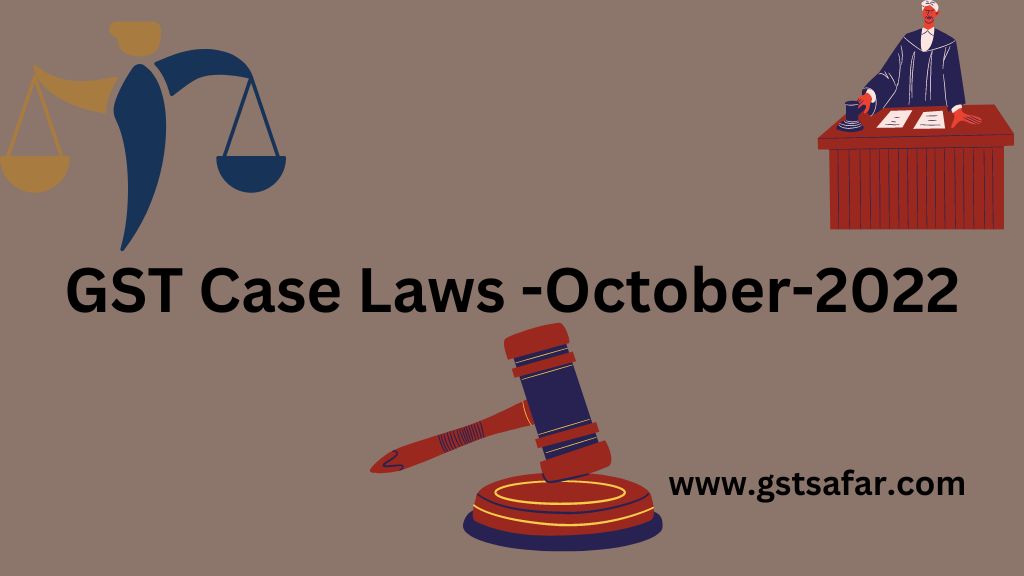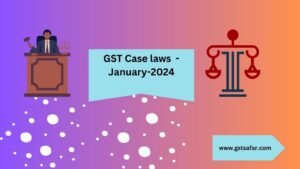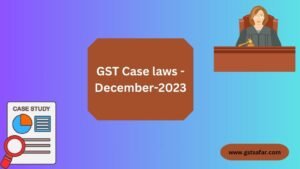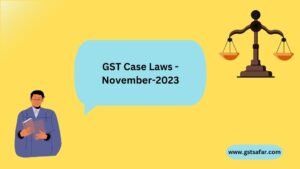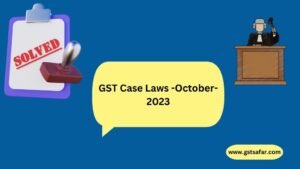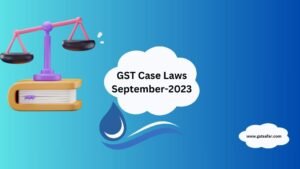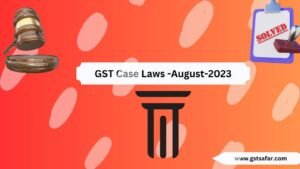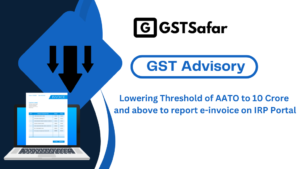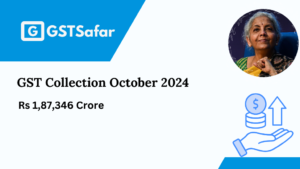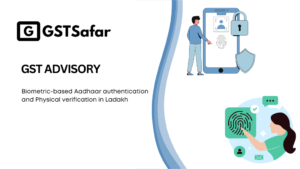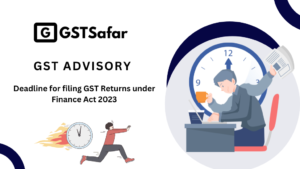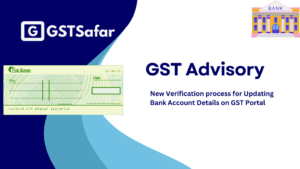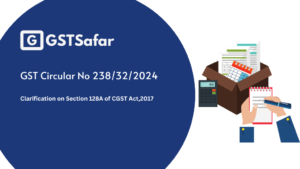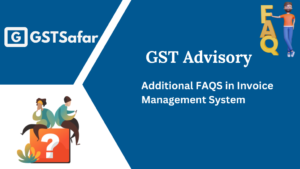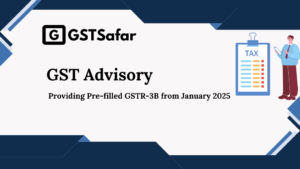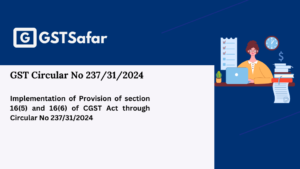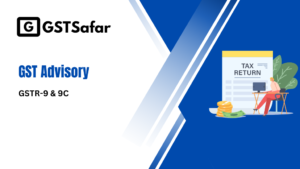The goal of this article is to cover all recent GST case laws 2022. All latest high court judgement on gst and all latest supreme court judgments on gst issued in October 2022 have been covered in this article. All latest GST case laws of October 2022 in this article have been classified by name, date, judge, counsel, GST concept, GST section, etc. In addition, a PDF of the GST case law is provided with the case law so that the user can download it for further study.
GST Case law on Alcoholic liquor| Recent GST Case Laws 2022
Andhra Pradesh High court says petitioner was liable to pay tax on manufacture of alcohol for human consumption by way of job work at 18 per cent with retrospective effect
| High Court : Andhra Pradesh High Court Judgement 2022 |
| Name of case : Esveeaar Distilleries (P.) Ltd. VS Assistant Commissioner (State Tax) |
| Date of Judgment : 20-10-2022 |
| Appeal No : WRIT PETITION NO.15534 OF 2022 |
| Judges : C. PRAVEEN KUMAR AND A.V. RAVINDRA BABU, JJ. |
| Counsel Name : S. Suri Babu |
| Fact of the Case: The petitioner argued that as per Sl. 26 of Notification No. 11/2017-Central Tax (Rate), alcoholic liquor should be considered as food and subjected to a 5% GST tax. It is being questioned whether the petitioner is liable to pay tax on alcoholic liquor at 18% with prospective or retrospective effect. |
| Held by court : As per the recommendation made by the GST Council, it has been clarified that alcoholic liquor is not considered as food and is excluded from the definition of food and food products in the relevant entry. Notification 6/2021-Central Tax (Rate), dated 30-9-2021, incorporates that services related to job work in the manufacture of alcoholic liquor intended for human consumption are subject to 18% GST. Since the petitioner’s manufacturing activities were related to ‘alcohol for human consumption’ through job work, they are liable to pay tax at 18%. |
| In favor of : Revenue |
| Topic of GST : Alcoholic Liquor -Concessional Tax Rate & Tax liability on it |
| Section of GST: Section 9 of CGST Act,2017 |
GST Case law on Writ Petition | Recent GST Case Laws 2022
Gujarat High Court Grants interim relief to petitioner
| High Court : Gujarat High Court Judgement 2022 |
| Name of case : ICICI Bank Ltd. vs. Union of India |
| Date of Judgment : 12-10-22 |
| Appeal No : R/SPECIAL CIVIL APPLICATION NO. 19559 OF 2022 |
| Judges : N. V. ANJARIA AND BHARGAV D. KARIA, JJ. |
| Counsel Name : Mihir Joshi, Kuntal A. Parikh and Parth Badheka |
| Fact of the Case: The petitioner, a banking company that lends money to customers for various purposes, including vehicle purchases, obtains collateral security in the form of movable and immovable assets to secure its loans. The petitioner challenged Rule 32(5), claiming it to be arbitrary and discriminatory as it distinguishes between registered and unregistered borrowers. When the petitioner repossesses a vehicle from a borrower and proceeds to sell it to recover the debt, the proviso provides that the purchase value of the repossessed goods from an unregistered borrower will be deemed to be the purchase price of such goods by the defaulting borrower, reduced for every quarter between the date of purchase and the date of disposal of the repossessed vehicle or goods. The petitioner further contended that Rule 32(5), read along with Notification 8/2018-Central Tax (Rate), clarifies that regardless of whether the borrower is registered or unregistered, the resulting GST liability must be the same, and there cannot be any distinction. |
| Held by court : High Court held that the submissions and contentions made on behalf of the petitioner have some substance and appear to be valid at first glance. To prevent any irreversible consequences, the petitioner was granted interim relief. |
| In favor of : Assessee |
| Topic of GST : Writ petition |
| Section of GST: Section 74 of CGST Act,2017 & Rule 32 of CGST Rules,2017 |
GST Case law on ITC in case of Transitional Provision | Recent GST Case Laws 2022
Andhra Pradesh High court says petitioner can avail the benefit of this judgment and upload the relevant material through Tran – 1 and Tran – 2 before 31-10-2022.
| High Court : Andhra Pradesh High Court Judgement 2022 |
| Name of case : Vihari Marketing (P.) Ltd. VS Assistant Commissioner of Central Tax |
| Date of Judgment : 20-10-2022 |
| Appeal No : WRIT PETITION NO. 44976 OF 2018 |
| Judges : U. DURGA PRASAD RAO AND T. MALLIKARJUNA RAO, JJ. |
| Counsel Name : M. VK. Moorthy |
| Fact of the Case: The petitioner attempted to file FORM TRAN-2 but was unable to do so, leading to a demand for tax with interest. Additionally, there was an error in the filing of the TRAN-1 Form, where the Central Excise column was mistakenly marked as ‘Yes’ instead of ‘No.’ The petitioner requested the opening of the GST portal for filing Forms TRAN-1 and TRAN-2 to avail of transitional credit. |
| Held by court : Court held the petitioner was able to avail the benefit and submit the relevant material through TRAN-1 and TRAN-2 before October 31, 2022. |
| In favor of : Assessee |
| Topic of GST : Input Tax Credit in case of Transitional provision |
| Section of GST: Section 140 of CGST Act,2017 |
GST Case law on Confiscation of goods and vehicles| Recent GST Case Laws 2022
Gujarat High Court order to release the goods and conveyance of the petitioner
| High Court : Gujarat High Court Judgement 2022 |
| Name of case : Shyamji Trading Company VS State of Gujarat |
| Date of Judgment : 13-10-2022 |
| Appeal No : R/SPECIAL CIVIL APPLICATION NO. 20732 OF 2022 |
| Judges : N. V. ANJARIA AND BHARGAV D. KARIA, JJ. |
| Counsel Name : Monal S. Chaglani |
| Fact of the Case: The department confiscated the goods and conveyance, and a similar application that dealt with the same issue had already been subjected to a rule. |
| Held by court : The current application was scheduled to be heard together with the pending application in another case. In the meantime, an interim relief was to be granted, which involved releasing the confiscated goods and conveyance upon the deposit of the demanded tax and penalty, and upon the furnishing of a bond towards the fine. The interim relief was deemed appropriate. |
| In favor of : Assessee |
| Topic of GST : Confiscation of goods and vehicles |
| Section of GST: Section 129 & 130 of CGST Act,2017 |
GST Case law on Refund| Recent GST Case Laws 2022
Gujarat High Court direct to Re-credit the amount in Electronic credit ledger with interest @ 9%
| High Court : Gujarat High Court Judgement 2022 |
| Name of case : M/S CHROMOTOLAB AND BIOTECH SOLUTIONS Versus UNION OF INDIA |
| Date of Judgment : 21-10-2022 |
| Appeal No : R/SPECIAL CIVIL APPLICATION NO. 16308 of 2020 |
| Judges : MR. JUSTICE N.V.ANJARIA & MR. JUSTICE BHARGAV D. KARIA |
| Counsel Name : MR DHAVAL SHAH |
| Fact of the Case: The applicant filed an application on the common portal within the time limit and fulfilled all the requirements of section 54 of the CGST Act, 2017 and rule 89 of the CGST Rules, 2017. However, a physical application with documents was filed beyond the two-year limitation period. The department did not take any action on the application filed on the common portal until the physical application was filed. |
| Held by court : The date of filing the claim for refund on the common portal should be considered as the date of filing, and the requirement in CBIC Circular No. 17/17/2017-GST, dated 15-11-2017, that a printout of the refund claim application must be submitted to the jurisdictional officer, cannot be a reason for failing to comply with the statutory provisions and denying the refund claim. |
| In favor of : Assessee |
| Topic of GST : Refund |
| Section of GST: Section 54 of CGST Act,2017 & Rule 93 of CGST Rules ,2017 |
Latest GST case laws PDF
GST Case law on Reply to Show Cause Notice | Recent GST Case Laws 2022
Bombay High Court Says respondent have passed order without applying his mind and without considering the records
| High Court : Bombay High Court Judgement 2022 |
| Name of case : Lakha Ram Vs Union of India (Bombay High Court) |
| Date of Judgment : 10-10-2022 |
| Appeal No : Writ Petition No. 12063 of 2022 |
| Judges : K.R. SHRIRAM & A.S. DOCTOR, JJ. |
| Counsel Name : Mr. Bharat Raichandani Mr. Rishabh Jain i/b UBR Legal |
| Fact of the Case: Mr. Raichandani on instructions states that petition has been served sometime in December 2021 and undertakes to file affidavit of service within one week from today. None present for respondents. Petitioner is impugning an order in original dated 30th June 2021 on the grounds that the observations of Respondent No.2 that petitioner has not submitted any reply to the charges levelled in the impugned show cause notice is erroneous in as much as petitioner had filed a reply dated 9th December 2019. Prior to the issuance of the show cause notice petitioner had received a letter from Respondent No.2 for verification of service tax payment vide letter dated 11th October 2019 to which petitioner had field reply by letter dated 9th December 2019. To the said letter were also annexed various documents. Subsequently, petitioner received show cause notice dated 30th December 2020 but strangely signed on 24th December 2020 to which petitioner had replied vide letter dated 29th December 2020 reiterating the contents of letter dated 9th December 2019.When petitioner received a notice for personal hearing from Respondent No.2, petitioner replied by letter dated 18th June 2021 and brought to the notice of respondent that petitioner has already given a detailed reply and enclosed copy thereof to the said letter dated 18th June 2021. Notwithstanding this respondent has issued impugned order dated 30th June 2021 issued on 6th July 2021 by observing that there has been no reply from petitioner. A copy of reply is also annexed to the petition and there is no denial by way of affidavit in reply. According to Mr.Raichandani, it is petitioner’s case that tax if any was payable on reverse charge basis and that has not been considered at all in the impugned order. |
| Held by court : Court considered the petition with the documents annexed thereto with the assistance of Mr. Raichandani. We are satisfied that petitioner had responded to the show cause notice and the same should have been considered and dealt with in the impugned order dated 6th July 2021. Respondent No.2 not having done that, impugned order requires to be quashed and set aside, which we hereby do. The matter is remanded for denovo consideration. Before passing any order, which shall be within eight weeks from today, petitioner shall be given a personal hearing, notice whereof shall be given atleast seven working days in advance. If petitioner wish to file any written submissions, petitioner may do so within three working days of the personal hearing. |
| In favor of : Assessee |
| Topic of GST : Reply to Show cause notice |
| Section of GST: Section 132 of CGST Act,2017 |
GST Case law on Principal of Natural Justice | Recent GST Case Laws 2022
Supreme Courts given all the liberty to assessee to raise all the legal grounds including ground of limitation
| High Court : Supreme Court Judgement 2022 |
| Name of case : Yaduka Agrotech (P.) Ltd. v. Commissioner of Central Goods and Services Tax |
| Date of Judgment : 31-10-2022 |
| Appeal No : SLP (C) NO.18357 OF 2022 |
| Judges : SURYA KANT AND J.B. PARDIWALA, JJ. |
| Counsel Name : Abhimanyu Bhandari Ms. Rooh-e-hina Dua, Ms. Mansi Gupta, |
| Fact of the Case: The communication before issuing the show cause notice was sent to the assessee without giving them an opportunity to be heard, and the notice itself was based on an audit report. |
| Held by court : The High Court had directed the authorities to consider the show cause notice as additional information to the audit report and conduct pre-SCN consultations accordingly. This provided the assessee with adequate opportunity to prove that there was no basis for issuing the SCN, thereby fulfilling the principles of natural justice. The assessee was permitted to raise all legal grounds, including the issue of limitation, before the Assessing Officer, who would make a decision based on their merits. |
| In favor of : Assessee |
| Topic of GST : Show Cause Notice |
| Section of GST: Section 132 of CGST Act,2017 |
GST Case law on Area Based Exemption | Recent GST Case Laws 2022
Gauhati High Court says industrial units can make representation to respective state high courts as well as GST Council for exemption
| High Court : Gauhati High Court Judgement 2022 |
| Name of case : Star Cement Ltd. |
| Date of Judgment : 31-10-2022 |
| Appeal No : W.P(C) NO. 2208 OF 2019 AND OTHS. |
| Judges : SOUMITRA SAIKIA, J. |
| Counsel Name : Dr. A. Saraf,R. Dubey Ms. N. Hawelia. |
| Fact of the Case: The Notification No. 20/2007-CE, dated 25-4-2007 granted tax exemption to industrial units for a period of 10 years from the date of commencement of their commercial production. However, after the introduction of GST with effect from 1-7-2017, various area-based exemption notifications, including Notification No. 20/2007-CE, dated 25-4-2007, were rescinded. Instead, a Scheme of Budgetary Support was framed vide Notification dated 5-10-2017, providing reimbursement of the Central Government’s share of CGST and/or IGST. The Notification No. 21/2017-CE, dated 18-7-2017, which withdrew exemption notifications, was issued in pursuance of the statutory mandate as provided under section 174(2)(c) of the CGST Act, 2017. The express provision in section 174(2)(c) provides that any tax exemption granted as an incentive against investment through notification under the erstwhile Central Excise Act, 1944, will not continue as a privilege if the notification is rescinded. There is a change in policy in view of the change in the statutory regime itself on account of the GST Act being introduced. The plea of promissory estoppel is not available against the exercise of legislative functions of the state. The Union Government is not bound by the representation made by Notification No. 20/2007-CE, dated 25-4-2007. The argument of promissory estoppel cannot be used to prevent the State from carrying out its legislative functions, nor can it be used to prevent the Government from performing its duties under the law. When a policy change is in the greater public interest, the State cannot be prevented from revoking an incentive that was previously granted through a notification. The issuance of a writ of mandamus as requested could not be granted unless the appellants could demonstrate that there was a statutory obligation imposed on the Union of India to grant them a full refund, following the withdrawal of the 10-year tax exemption. As no obligation was imposed on the respondent to refund 100% of the CGST, a writ of mandamus could not be granted. The appellants had established industrial units based on the industrial policy outlined in Notification No. 20/2007-CE, dated 25-4-2007, which granted a 10-year tax exemption. When this exemption was rescinded, the appellants had a legitimate expectation that their claim for a refund of GST would be given due consideration, even if they did not have a legal claim to it. As a result, the appellants were allowed to make representations to the respective state high courts and the GST council. |
| Held by court : The revocation of the tax exemption granted to industrial units for a period of 10 years on the introduction of GST cannot be disputed on the grounds of promissory estoppel. Furthermore, the Union Government was not obligated to follow the representation made in Notification No. 20/2007-CE, dated 25-4-2007. The plea of promissory estoppel cannot be used to prevent the State from exercising its legislative functions, and if a change in policy is in the larger public interest, the State cannot be stopped from withdrawing an incentive granted through an earlier notification. A writ of mandamus could not be issued to compel the Union to refund 100% of the CGST upon the withdrawal of the 10-year tax exemption, as there was no legal obligation for the Union to do so. The appellants established industrial units based on the industrial policy outlined in Notification No. 20/2007-CE, dated 25-4-2007, which provided for a 10 year tax exemption. Although they may not have had a legal claim when the exemption was withdrawn due to the introduction of GST, they had a legitimate expectation that their claim would be given due consideration, and they were allowed to make representations to their respective State High Courts and the GST council. |
| In favor of : Revenue |
| Topic of GST : Area based exemption, Doctrine of Promissory estoppel, Repeal and savings, Migration to GST |
| Section of GST: Section 174 of CGST Act,2017 & Section 54 of CGST Act,2017 |
GST Case Law on interest| Recent GST Case laws 2022
Chhattisgarh High Court says Interest on net tax liability is effective from 01-07-2017
| High Court : Chhattisgarh High Court Judgement 2022 |
| Name of case : Abis Export India (P.) Ltd .vs. State of Chhattisgarh |
| Date of Judgment : 31-10-2022 |
| Appeal No : WPT NO. 100 OF 2019 |
| Judges : NARENDRA KUMAR VYAS, J. |
| Counsel Name : Rajeev Shrivastava, Sourabh Sahu, Sandeep Dubey |
| Fact of the Case: The amendment to section 50(1) of the CGST Act made by the Finance Act, 2021, which inserts a proviso allowing for the calculation of interest on a net cash liability basis, applies retrospectively from 1 July 2017. The decision of the Appellate authority, which held that the appeal was not maintainable due to the failure to pre-deposit and did not consider the interest on the net cash liability basis for calculating the pre-deposit amount, has been overturned. The matter has been sent back to the Appellate Authority for reconsideration on whether to allow the consequential relief as per the proviso to section 50(1) when calculating the pre-deposit amount required under section 107(6) for an appeal to be maintained by the assessee. |
| Held by court : The amendment to Section 50 of the GST Act, which is effective from 1-7-2017, allows interest on tax payable to be levied on the portion of tax paid by debiting the electronic cash ledger. This amendment has retrospective applicability. The writ petition is disposed of, with a direction to the appellate authority to examine whether the petitioner can be extended benefits of the amendment or not, with regard to overcoming the condition precedent for maintaining an appeal under the GST Act 2017. The appellate authority will decide the appeal after examining the effect of the amendment in accordance with the law and giving an opportunity of hearing to the petitioner. The impugned order dated 11-9-2018 is set aside and the matter is remitted back to the appellate authority to decide the appeal of the petitioner afresh within four months from the date of receipt of the order passed by this Court. The writ petition is partly allowed. |
| In favor of : Partly in favor of assessee & Partly in favor of revenue |
| Topic of GST : Retrospective effect of Finance act 2021 with respect to Net cash liability & interest on delayed payment of GST |
| Section of GST: section 50 of CGST Act 2017 |
GST Case Law on Input Tax Credit Transfer| Recent GST Case laws 2022
Madras High Court says Petitioner can file fresh petition before IT Grievance Redressal Committee for transfer of credit
| High Court : Madras High Court Judgement 2022 |
| Name of case : Ramaraju Surgical Cotton Mills Ltd. vs. Additional Commissioner of CGST and Central Excise |
| Date of Judgment : 31-10-2022 |
| Appeal No : W.P(MD).NO.24665 OF 2022 |
| Judges : MRS. S. SRIMATHY, J. |
| Counsel Name : Mrs. Radhika Chandra Sekhar |
| Fact of the Case: The petitioner claimed that the GST portal did not permit them to file Form GST ITC-02A for transferring ITC to its newly registered unit as the prescribed time limit of 30 days had elapsed, while the petitioner contended that the time period had not expired. |
| Held by court : Court Held The petitioner was unable to file Form GST ITC-02A within the prescribed time limit of 30 days due to the common portal’s unavailability. As a result, the petitioner was instructed to submit a new petition before the IT Grievance Redressal Committee, as they were entitled to the credit, and the committee would examine the petition based on the precedent set in Pacific Industries Ltd. v. Union of India. |
| In favor of : Assessee |
| Topic of GST : Input Tax Credit transfer pursuant to GST registration |
| Section of GST: Section 18 of CGST Act,2017 Section 25 of CGST Act,2017 Rule 41A of CGST Rules,2017 |
GST Case Law on Investigation| Recent GST Case laws 2022
Bombay High Court says where chairman and MD has signed and verified petition on oath when summons were issued, he could not be exempted from appearance before GST authority
| High Court : Bombay High Court Judgement 2022 |
| Name of case : Suumaya Industries Ltd. VS Union of India |
| Date of Judgment : 04-10-2022 |
| Appeal No : WRIT PETITION LODGING NO.30285 OF 2021 |
| Judges : K.R. SHRIRAM AND A.S. DOCTOR, JJ. |
| Counsel Name : Abhishek Rastogi and Ms. Akshita Shetty |
| Fact of the Case: The petitioner-company made a request to the department not to summon its Chairman and Managing Director for investigation. However, the department argued that the Director in question had already appeared before and provided his statement. |
| Held by court : Court held that the Director, who signed and verified the instant petition on oath, was aware of the facts and circumstances surrounding the case and therefore could not be exempted from appearing before the concerned authority. The department has the power to issue summons to anyone, including the Director, and consider the refund application filed by the petitioner-company in accordance with the law. The person who is summoned must appear before the authority at the appointed time and date without fail. |
| In favor of : Revenue |
| Topic of GST : Investigation & Summons |
| Section of GST: Section 70 of CGST Act,2017 |
GST Case law on Time limit for filling Refund Application| Recent GST Case laws 2022
Madras High Court says the portion of the request for refund has been extended
| High Court : Madras High Court Judgement 2022 |
| Name of case : Bharat Heavy Electricals Ltd. vs. Deputy/Assistant Commissioner of GST and Central Excise |
| Date of Judgment : 14-10-2022 |
| Appeal No : W.P.(MD) NOS. 13190 AND 13191 OF 2022 W.M.P.(MD) NOS. 9371 AND 9372 OF 2022 |
| Judges : MOHAMMED SHAFFIQ, J. |
| Counsel Name : K. Prabhakar |
| Fact of the Case: The Petitioner’s request for a refund was declined as it was submitted after the relevant period specified under section 54(1) of the Central Goods and Services Tax Act, 2017 (referred to as ‘the Act’), and the Respondent relied on Circular No. 157/13/2021-GST issued by the Central Board of Indirect Taxes and Customs on 20-7-2021, which states that the time limit cannot be extended, even in light of the pandemic |
| Held by court : The court ruled that the Department must examine the refund application submitted by the petitioner within the specified time limit, taking into account Notification No. 13/2022-Central Tax, and issue an order in compliance with the law. |
| In favor of : Assessee |
| Topic of GST : Section 54 & Section 55 of CGST Act,2017 |
| Section of GST: Refund |
GST Case law on Bail in case of ITC Fraud| Recent GST Case laws 2022
Allahabad High court says bail application was to be granted as a tax evasion less than 500 lakhs categorized as bailable offence
| High Court : Allahabad High Court Judgement 2022 |
| Name of case : Vishnu Pratap VS State of U.P |
| Date of Judgment : 18-10-2022 |
| Appeal No : CRIMINAL MISC. BAIL APPLICATION NO. 34917 OF 2022 |
| Judges : SUBHASH VIDYARTHI, J. |
| Counsel Name : Sanyukta Singh and Shubham Agrawal |
| Fact of the Case: The applicant was apprehended for committing the offense of avoiding payment of GST amounting to Rs. 444 lakhs by falsely claiming input tax credit through fabricated documents and transactions. |
| Held by court : The applicant was accused of committing an offense related to tax evasion involving an amount below 500 lakhs, which was categorized as a bailable offense punishable by up to three years of imprisonment and a fine. It was also noted that the applicant had no previous criminal history. Therefore, the court allowed the bail application and ordered for the applicant to be released on bail. |
| In favor of : Assessee |
| Topic of GST : Bail /ITC Fraud |
| Section of GST: Section 132 of CGST Act,2017, Section 122 of CGST Act,2017 |
GST Case law on GST Levy on Land allotment| Recent GST Case laws 2022
Madhya Pradesh High court says Bhopal Development Authority to reconsider the question of levy of GST on the sale of developed plots to the petitioners.
| High Court : Madhya Pradesh High Court Judgement 2022 |
| Name of case : Shraddha Tiwari vs. Bhopal Development Authority |
| Date of Judgment : 27-10-2022 |
| Appeal No : WRIT PETITION NO. 257 OF 2022 |
| Judges : SHEEL NAGU AND PRAKASH CHANDRA GUPTA, JJ. |
| Counsel Name : Atul Anand Awasthy, Amit Khatri and Abhay Tiwari |
| Fact of the Case: The petitioners received land allotment notices that imposed a GST rate of 12% on the sale consideration for the purchase of developed land from the Bhopal Development Authority. Petitions were filed against the notices. While the petitions were pending, the Government of India, Ministry of Finance, Department of Revenue issued Circular No. 177/09/2022-TRU on 3-8-2022, providing clarifications on the applicable GST rates and exemptions for the services in question. |
| Held by court : Considering the clarification, it is necessary to direct the Bhopal Development Authority to make a decision on the matter. |
| In favor of : Assessee |
| Topic of GST : GST Levy on Land allotment |
| Section of GST: Section 9 of CGST act,2017 |
FAQS
What is the case law for alcohol?
As per Andhra Pradesh High court judgement in case of Esveeaar Distilleries (P.) Ltd. VS Assistant Commissioner court held that petitioner was liable to pay tax on manufacture of alcohol for human consumption by way of job work at 18 per cent with retrospective effect
Read similar article
